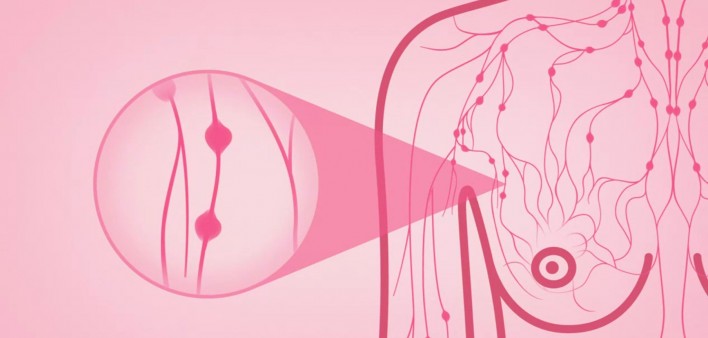Not all forms of breast cancer present with an obvious lump. Lumps are not usually physically apparent with Inflammatory Breast Cancer, which is a rare but aggressive form of breast cancer.
Cancer cells in Inflammatory Breast Cancer block lymph vessels in the skin of the breast, resulting in “inflammatory” symptoms, such as swelling or redness. The redness may range from pink to reddish purple and the breast may also appear bruised. In addition the skin may appear dimpled or pitted like the surface of an orange. Sometimes a solid tumor may be detected upon a physical examination, but most often a tumor can’t be felt.
A quick increase in breast size, sensation of heaviness, hardness, tenderness, burning and even an inverted nipple can be symptoms of Inflammatory Breast Cancer. Because lymph flow isn’t flowing freely, Inflammatory Breast Cancer may also cause swollen lymph nodes under the arm and/or near the collar bone.
The best way to monitor for breast cancer, besides regularly scheduled mammographies, is to pay attention to any changes in your breast. Such as swelling or hardening of the breast, redness of the breast especially over a large area, dimpling, pitting, scales, or thickening of the skin or nipple. Breast or nipple pain, nipple discharge that is bloody, nipple turning inwards, or swollen lymph nodes may also be symptoms.
Having any of these symptoms doesn’t mean it’s a given that you have breast cancer. Breast infections (mastitis) also cause similar inflammatory symptoms and fibrocystic changes of the breast can cause pain. However, if your symptoms persist for over a week despite treatment, especially if your breast remains reddened and looks like it has an infection, then Inflammatory Breast Cancer needs to be ruled out.
An experienced breast surgeon will usually be able to distinguish between mastitis and Inflammatory Breast Cancer with a physical examination. If the clinical breast exam indicates that it might be Inflammatory Breast Cancer, a small skin biopsy can be performed in the office to confirm the presence of cancer cells. If the diagnosis is Inflammatory Breast Cancer, treatment will need to be aggressive, since this type of breast cancer progresses rapidly.
*Public Service Information taken from written studies and published data.
